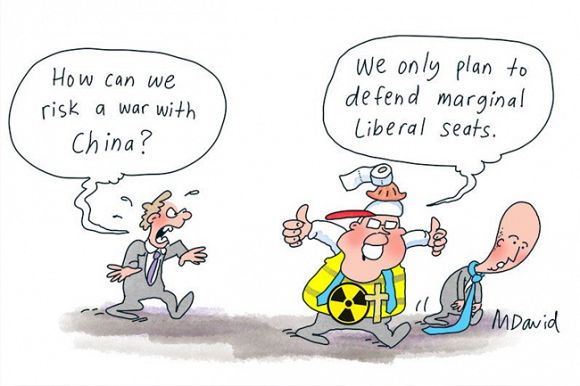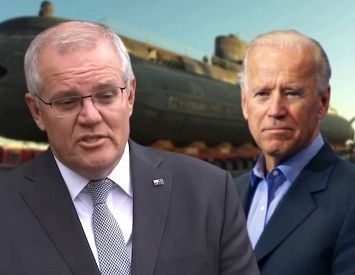In times of looming conflict with the neighbours, we all know one thing: even the briefest of friendly grins can do a bit to calm things down.
Which tactic is more likely to help soothe rage and resentment, a snarl and a clenched fist, or an amiable "g'day"?
It was with some consternation, therefore, that I listened to Geraldine Doogue's recent Saturday Extra interview on ABC Radio National. For more than half an hour, three of Australia's top international strategic defence experts spoke on the topic: can Australia afford the big spend defence commitments from AUKUS?
The guests were the defence analyst Dr Alan Dupont, retired Major-General Gus McLachlan, and the director of the Lowy Institute’s International Security Program, Sam Roggeveen.
Now obviously their job was not to debate the deep philosophical nuances of war and peace. Not even the twisting, snarky politics of it all. It was simply to examine how best to spend government money on defence. This sub or that one? New heavier tanks, or to keep the old ones?
To simply defend our isolated continent, or to be able to attack places far from home?
All this was heavily influenced, of course, by our glued-to-the-gunnels arrangement with the U.S. and the need for our army, navy and airforce to "plug seamlessly" into America's Pacific forces. Which planes are the best match? Which missiles would be best to attack Chi... oops! Ahem! To attack some enemy?
"Our army is something of a hybrid force," said Gus McLaughlan. "Bits and pieces of technology from a number of different countries. But it's been useful to go off and do these foreign wars – Iraq and Afghanistan".
No surprises there.
But something vaguely disturbing occurred during the interview. Or rather, did not occur. In vain, I waited for even the faintest hint of a suggestion from the experts that, armaments and finances aside, besides wheeling out all the big guns, it might be worth at least mentioning something more subtle and weightier.
How about hinting that the Government might take a few delicate, tentative steps towards maintaining peace? While discussing preparations for war, what about a reference to diplomacy? Many a crisis has been soothed over a cuppa, a beer, or even a friendly chat on the phone. Whereas continually poking that bear causes a problem or two.
As I've said, nuance was definitely not the guests' defined job that morning. The nuts and bolts of Australia's preparation for battle was their area of expertise; how to pay for it was their task for the day.
But not even in the most casual, offhand way was there a nod to any alternative to outright skilling up for war.
Of course, war is the most horrific of threats. But we live with other looming dangers as well. Floods. Pandemics. The bushfires threaten our home among the gumtrees.
How would three top bushfire experts discuss their work in a half-hour interview? Would the entire time be taken up with comparisons of fire-engines? Of hoses; ladders; boots; helmets; the advantages of this brand of ee-aw-ee-aw siren over that one?
Such a long, one-sided discussion would be strange indeed. Everyone would notice the oddity of it.
But where war and peace are concerned, many of us seem to have handed responsibility over to governments so completely that we question little. Not even the fortunes being made by weapons manufacturers under the cover of our "security blanket". Increasing public-private partnerships in defence are quietly all the go, though the Minister for Defence, Richard Marles, said recently that defence procurement is "a complete mess."
Daily, the media may hiss that China is lurking there, just waiting to pounce.
Some of our fellow citizens – perhaps politicians; perhaps media big wheels – might clench their fists and grimace fiercely at thought of the thrills to come. With war so often having proved a political winner, there are votes to be raked in there, remember!
But surely we know from daily life that sometimes a bit of friendly dialogue with prospective "enemies" really can help calm things down.
Frances Letters is a writer, journalist, meditation teacher and activist.
Related Articles
- Anti-AUKUS campaign ramps up over U.S.-China war talk
- AUKUS: The militarisation of Australia
- Morrison's Australia remains servile under AUKUS agreement
- Australia's defence program is dead in the water
- Australians look in vain for independent foreign policy
 This work is licensed under a Creative Commons Attribution-NonCommercial-NoDerivs 3.0 Australia License
This work is licensed under a Creative Commons Attribution-NonCommercial-NoDerivs 3.0 Australia License
Support independent journalism Subscribe to IA.














